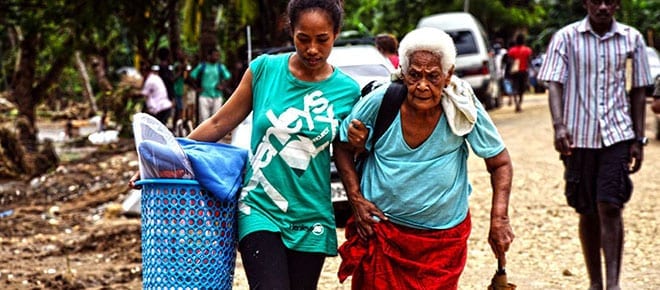The tragic deaths of 18 children from extreme diarrhoea in the Solomon Islands are a stark reminder that while floodwaters have subsided, the impact of the disaster remains life threatening and the need for a rapid, coordinated response essential.

The tragic deaths of 18 children from extreme diarrhoea in the Solomon Islands are a stark reminder that while floodwaters have subsided, the impact of the disaster remains life threatening and the need for a rapid, coordinated response essential.
Solomon Islands Ministry of Health has released a nationwide health alert following the fatalities — all children under the age of five — with reports that 1000 people had contracted the diarrhoea-causing rotavirus, and case numbers are expected to rise.
Minimising risk
Oxfam Solomon Islands Country Director Katie Greenwood said it was believed the virus had broken out in flood-affected Honiara and spread across six provinces, and it was essential there now be a swift, coordinated response to contain the disease.
“While the planning, response and surveillance work undertaken by the Ministry of Health and the World Health Organisation to minimise the outbreak and spread of preventable disease has been commendable and well executed, it is essential that there now be a swift, coordinated response to contain the disease and other impacts of the recent flooding,” Ms Greenwood said.
“Water and sanitation are key areas of concern, with a lack of clean drinking water and sanitation the main risk factors that need to be addressed to prevent the disease from spreading, but we also need an ongoing commitment to the coordination mechanisms established by the Government and supported by UN and NGOs, to improve information sharing and maximise the effectiveness of our joint response.”
Life saving response
As part of its response, Oxfam has distributed vital, lifesaving non-food items such as soap and sanitation kits, in collaboration with other NGOs such as Red Cross and World Vision. Washing hands with soap can reduce the risk of diarrhoeal diseases by 47 per cent.
Oxfam monitoring teams are also regularly visiting evacuation centres and affected communities to speak with flood-affected people about the effectiveness of the response, key safety issues such as violence against women and child protection and assess basic needs, including access to clean drinking water.
“Protection reports have been compiled from the first week of the response and passed to Government and other agencies, providing evidence of the need for targeted response strategies, which take advantage of collaboration to increase efficiency and effectiveness,” Ms Greenwood said.



